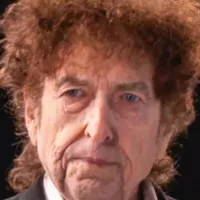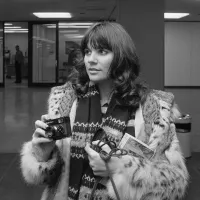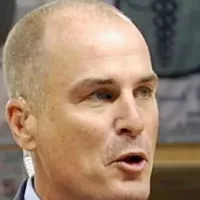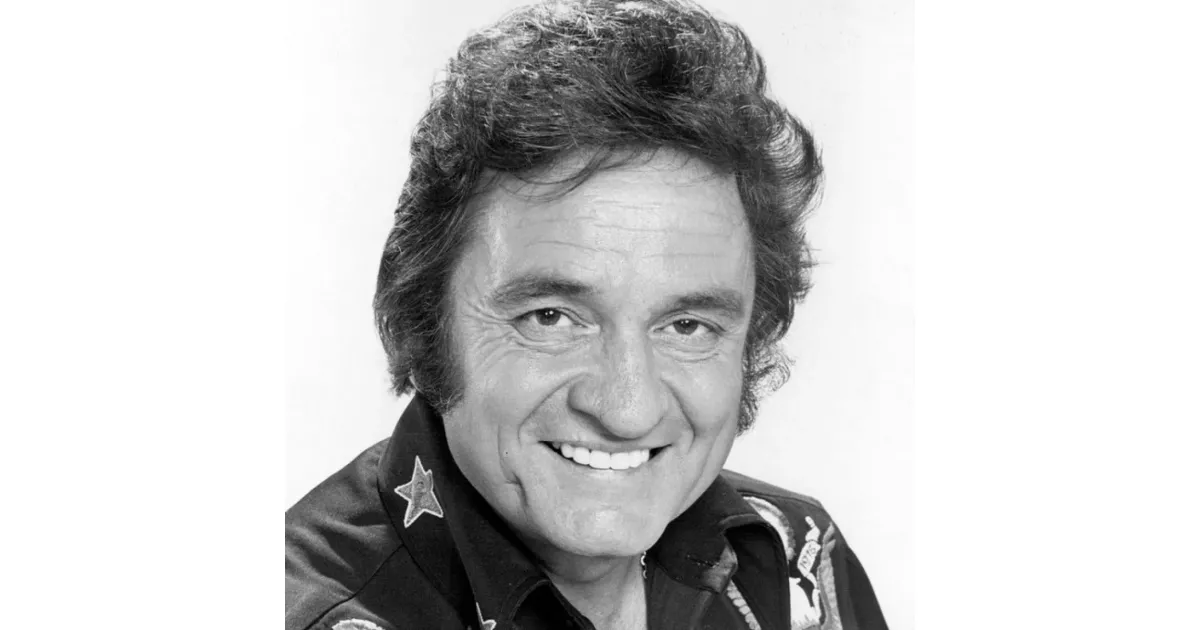From career breakthroughs to professional milestones, explore how Johnny Cash made an impact.
Johnny Cash, the "Man in Black," was a highly influential American singer-songwriter renowned for his distinctive bass-baritone voice and the signature train-like sound of his band, the Tennessee Three. His music often explored themes of sorrow, moral struggles, and redemption, particularly in his later work. Known for his rebellious persona juxtaposed with a somber humility, he famously performed free concerts in prisons. Cash's all-black attire became his trademark, solidifying his iconic status in music history.
1954: Cash Moves to Memphis and Auditions for Sun Records
In 1954, Johnny Cash and his first wife Vivian moved to Memphis, Tennessee. Cash worked as an appliance salesman while studying to be a radio announcer, and he auditioned for Sam Phillips at Sun Records, initially focusing on gospel songs.
1955: Cash Makes First Recordings at Sun Records
In 1955, Johnny Cash made his first recordings at Sun Records with "Hey Porter" and "Cry! Cry! Cry!", which were released in late June and became successful on the country hit parade.
1955: Cash Signs with Sun Records
In 1955, Johnny Cash signed with Sun Records and began using the name "Johnny Cash".
December 4, 1956: Million Dollar Quartet Jam Session
On December 4, 1956, Elvis Presley, Carl Perkins, Jerry Lee Lewis, and Johnny Cash had an impromptu jam session at Sun Records, later released as the "Million Dollar Quartet". Cash mentioned in his autobiography that he sang in a higher pitch to blend in with Elvis since he was farthest from the microphone.
July 1957: Cash Records "Home of the Blues" and Releases First Album
In July 1957, Johnny Cash recorded "Home of the Blues". That same year, Cash became the first Sun artist to release a long-playing album. He felt constrained by his contract due to low royalties and Phillips' focus on Jerry Lee Lewis.
January 1, 1958: First Notable Prison Concert
On January 1, 1958, Johnny Cash played his first notable prison concert at San Quentin State Prison in California.
1958: Cash Signs with Columbia Records
In 1958, Johnny Cash left Sun Records to sign a lucrative deal with Columbia Records. His single "Don't Take Your Guns to Town" became one of his biggest hits. He also recorded a collection of gospel songs for his second album for Columbia.
1960: Sun Records Release of "Oh Lonesome Me" Cover
In 1960, Sun Records released Johnny Cash's cover of "Oh Lonesome Me", which reached number 13 on the C&W charts, despite Cash having already moved to Columbia Records.
1961: Cash Appears in 'Five Minutes to Live'
In the 1961, Johnny Cash appeared in, and wrote and sang the opening theme for, a film entitled "Five Minutes to Live", which was later re-released as "Door-to-door Maniac".
1963: Release of 'Ring of Fire: The Best of Johnny Cash'
In 1963, Johnny Cash released 'Ring of Fire: The Best of Johnny Cash', the promotional picture of which was later featured on a Forever stamp.
August 22, 1964: Advertisement in Billboard Regarding Ira Hayes Song
On August 22, 1964, Johnny Cash posted a letter as an advertisement in Billboard magazine, defending his song "Ira Hayes" and criticizing the record industry's fear of controversial topics.
1964: Recording of Bitter Tears: Ballads of the American Indian
In 1964, Johnny Cash recorded the album "Bitter Tears: Ballads of the American Indian".
1964: Release of 'Bitter Tears' Album
In 1964, Johnny Cash released his concept album "Bitter Tears", which addressed the plight of Native Americans. It met with resistance from some fans and radio stations due to its controversial themes.
May 11, 1965: Cash Arrested in Starkville, Mississippi
On May 11, 1965, Johnny Cash was arrested in Starkville, Mississippi, for trespassing to pick flowers. He later used this incident as inspiration for his song "Starkville City Jail".
1965: Appearance on Rainbow Quest
In 1965, Johnny Cash and June Carter appeared on Pete Seeger's TV show, Rainbow Quest, where Cash discussed his activism for Native Americans.
1965: Release of 'Sings the Ballads of the True West'
In 1965, Johnny Cash released "Sings the Ballads of the True West", an experimental double record featuring frontier songs and his spoken narration.
1966: Adoption by Seneca Nation's Turtle Clan
In 1966, Johnny Cash was adopted by the Seneca Nation's Turtle Clan in recognition of his activism.
1967: Cash and June Carter Win Grammy for "Jackson"
In 1967, Johnny Cash's duet with June Carter, "Jackson", won a Grammy Award.
February 22, 1968: Cash Proposes to June Carter
On February 22, 1968, Johnny Cash proposed to June Carter onstage at a concert in London, Ontario, Canada.
1968: Benefit at Rosebud Reservation
In 1968, Johnny Cash performed a benefit at the Rosebud Reservation to raise money to help build a school.
1968: Release of 'At Folsom Prison'
In 1968, Johnny Cash's live album "At Folsom Prison" was released, later recognized by Rolling Stone as one of the 500 greatest albums of all time.
1968: Release of Johnny Cash at Folsom Prison Album
In 1968, the live recording of Johnny Cash's performance at Folsom Prison was released as the album "Johnny Cash at Folsom Prison", which became a highly successful album.
June 1969: Start of The Johnny Cash Show
In June 1969, Johnny Cash began starring in his own television show, "The Johnny Cash Show", on the ABC network.
1969: Concerts at New Mexico State Fair
From September 15-18, 1969, Johnny Cash performed a series of four concerts at the New Mexico State Fair to promote the first season of The Johnny Cash Show.
1969: Release of Johnny Cash at San Quentin Album and International Hit Status
In 1969, the live album "Johnny Cash at San Quentin" was released, reaching the top of the Billboard charts and becoming an international hit. In 1969, Cash sold 6.5 million albums, outselling even The Beatles.
1970: Performance at the White House
In 1970, Johnny Cash performed at the White House, declining Richard Nixon's request to play certain songs and instead choosing to play "The Ballad of Ira Hayes", "What Is Truth", and "Man in Black".
1970: Recording of Cherokee Removal Essay
In 1970, Johnny Cash recorded a reading of John G. Burnett's 1890 essay on Cherokee removal for the Historical Landmarks Association in Nashville.
March 1971: End of The Johnny Cash Show
In March 1971, The Johnny Cash Show, on the ABC network, ended.
1971: Release of "Man in Black"
In 1971, Johnny Cash's song "Man in Black" codified an image that the singer had assumed naturally for more than fifteen years, portraying him as a blue-collar prophet who spoke truth to power.
1971: Golden Globe Nomination
In 1971, the title song, "The Ballad of Little Fauss and Big Halsy", written by Carl Perkins for the film "Little Fauss and Big Halsy" and performed by Johnny Cash, was nominated for a Golden Globe award.
1972: Performance at Österåker Prison in Sweden
In 1972, Johnny Cash performed at the Österåker Prison in Sweden.
1973: Release of Gospel Road: A Story of Jesus Film
In 1973, Johnny Cash co-wrote and narrated the film about the life of Jesus, "Gospel Road: A Story of Jesus", which was then released.
1973: Release of På Österåker Album
In 1973, the live album "På Österåker (At Österåker)" was released.
November 22, 1974: Riding The Rails TV Special
On November 22, 1974, CBS aired Johnny Cash's one-hour TV special entitled "Riding The Rails", a musical history of trains.
March 17, 1975: Special Concert at Naval War College
On March 17, 1975, Johnny Cash, along with The Tennessee Three, June Carter Cash, and Carl Lee Perkins, performed a special concert for a military audience at the Naval War College in Rhode Island.
1975: Autobiography 'Man in Black'
In 1975, Johnny Cash's autobiography, "Man in Black," was released, offering insights into his life and career.
1975: Publication of Man in Black Autobiography
In 1975, Johnny Cash's first autobiography, "Man in Black", was published.
1976: Commercials for Lionel Trains
In 1976, Johnny Cash made commercials for Lionel Trains, for which he also wrote the music.
1976: Concert at Tennessee State Prison Videotaped
In 1976, Johnny Cash's concert at Tennessee State Prison was videotaped for TV broadcast.
1977: Induction into Nashville Songwriters Hall of Fame
In 1977, Johnny Cash was inducted into the Nashville Songwriters Hall of Fame.
1979: Recording of Gospel Double-LP
In 1979, Johnny Cash recorded "A Believer Sings the Truth", a gospel double-LP that was released on an independent label despite Cash's contract with Columbia.
1980: Beginning of JC Unit One tour bus usage
In 1980 Johnny Cash began using JC Unit One as his private tour bus until 2003.
1980: Induction into Country Music Hall of Fame
In 1980, Johnny Cash became the Country Music Hall of Fame's youngest living inductee at age 48.
1981: Recording Sessions with Billy Sherrill
Between 1981 and 1984, Johnny Cash recorded several sessions with Billy Sherrill, which were shelved and later released in 2014.
1981: Starring Role in The Pride of Jesse Hallam
In 1981, Johnny Cash starred in "The Pride of Jesse Hallam", a television film that addressed adult illiteracy.
1983: Appearance in Murder in Coweta County
In 1983, Johnny Cash appeared as a heroic sheriff in "Murder in Coweta County", a film based on a real-life murder case.
1984: Leaving Columbia Records
After more unsuccessful recordings were released between 1984 and 1985, Johnny Cash left Columbia Records.
1984: Recording Sessions with Billy Sherrill
Between 1981 and 1984, Johnny Cash recorded several sessions with Billy Sherrill, which were shelved and later released in 2014.
1984: Release of "The Chicken in Black"
In 1984, Johnny Cash released a self-parody recording titled "The Chicken in Black".
1985: Leaving Columbia Records
After more unsuccessful recordings were released between 1984 and 1985, Johnny Cash left Columbia Records.
1985: Appearance in North and South Miniseries
In 1985, Johnny Cash gave a performance as abolitionist John Brown in the American Civil War television miniseries "North and South".
1985: Release of Highwayman Album with The Highwaymen
In 1985, Johnny Cash, along with Waylon Jennings, Willie Nelson, and Kris Kristofferson as the Highwaymen, released their album "Highwayman".
1986: Publication of 'Man in White'
In 1986, Johnny Cash penned a Christian novel titled "Man in White", reflecting his religious beliefs and identity.
1986: Recording of Class of '55 Album
In 1986, Johnny Cash returned to Sun Studios in Memphis to team up with Roy Orbison, Jerry Lee Lewis, and Carl Perkins to create the album "Class of '55".
1987: Signing with Mercury Records
In 1987, after being dropped by Columbia Records, Johnny Cash signed with Mercury Records, marking the beginning of a short and unsuccessful stint with the label.
1988: 'Til Things Are Brighter' Tribute Album
In 1988, British musicians Marc Riley and Jon Langford created 'Til Things Are Brighter, a tribute album featuring interpretations of Johnny Cash's songs by British indie-rock artists. Cash expressed enthusiasm for the project.
1990: Recording of Johnny Cash Reads The Complete New Testament
In 1990, Johnny Cash recorded "Johnny Cash Reads The Complete New Testament".
1990: Release of Highwaymen 2 Album
In 1990, the Highwaymen (Johnny Cash, Waylon Jennings, Willie Nelson, and Kris Kristofferson) released their album "Highwaymen 2".
1991: Collaboration with One Bad Pig
In 1991, Johnny Cash sang a version of "Man in Black" for the Christian punk band One Bad Pig's album I Scream Sunday.
1991: End of Mercury Records Contract
In 1991, Johnny Cash's contract with Mercury Records ended, concluding a period that was marked by limited success for the artist.
1992: Induction into Rock and Roll Hall of Fame
In 1992, Johnny Cash was inducted into the Rock and Roll Hall of Fame.
1993: Collaboration with U2
In 1993, Johnny Cash collaborated with U2, singing "The Wanderer" on their album Zooropa. Bono wrote the song for Cash.
1993: Recording of 'Songwriter' Demos
In 1993, Johnny Cash recorded demos that would later be released in the compilation album 'Songwriter' in 2024. These demos featured guest artists including Vince Gill and the Black Keys.
1994: Signing with American Recordings and Release of 'American Recordings'
In 1994, Johnny Cash signed with Rick Rubin's American Recordings label and released the album American Recordings, recorded in his living room with only his Martin Dreadnought guitar. The album won a Grammy.
1994: Release of 'American Recordings'
In 1994, Johnny Cash's studio album "American Recordings" was released, later recognized by Rolling Stone as one of the 500 greatest albums of all time.
1995: Release of Highwaymen – The Road Goes On Forever Album
In 1995, The Highwaymen (Johnny Cash, Waylon Jennings, Willie Nelson, and Kris Kristofferson) released their album "Highwaymen – The Road Goes On Forever".
January 1996: Collaboration on 'Twisted Willie' Tribute Album
In January 1996, Johnny Cash collaborated with Kim Thayil, Krist Novoselic, and Sean Kinney to cover Willie Nelson's "Time of the Preacher" for the tribute album Twisted Willie.
1996: Collaboration on 'Unchained'
In 1996, Johnny Cash collaborated with Tom Petty and the Heartbreakers on the album Unchained, also known as American Recordings II. Rick Rubin produced the album.
1996: Crow Records 'Redemption Day'
In 1996, Sheryl Crow originally wrote and recorded the song "Redemption Day", which Johnny Cash later recorded for his "American VI: Ain't No Grave" album and Crow would later add new vocals to for her album Threads in 2019.
1997: Publication of 'Cash: The Autobiography'
In 1997, Johnny Cash wrote Cash: The Autobiography, believing he had not explained enough of himself in his previous autobiography, Man in Black.
1999: All-Star Tribute Concert on TNT
In 1999, a diverse group of artists paid tribute to Johnny Cash at an all-star concert which aired on TNT. Cash performed for the first time in over a year. Cash also influenced Dylan's shift to electric guitar.
2000: Release of 'American III: Solitary Man'
In 000, Johnny Cash released the album American III: Solitary Man, part of his later career resurgence with American Recordings.
2001: Awarded National Medal of Arts
In 2001, Johnny Cash was awarded the National Medal of Arts.
2002: Release of 'American IV: The Man Comes Around'
In 2002, Johnny Cash released the album American IV: The Man Comes Around, which featured covers of songs by rock artists such as Nine Inch Nails and Depeche Mode. The album included the song "Hurt".
August 21, 2003: Final Recording Session
On August 21, 2003, Johnny Cash made his final recordings, including "Like the 309" and "Engine 143", shortly before his death.
2003: End of JC Unit One tour bus usage
In 2003 Johnny Cash ended using JC Unit One as his private tour bus which he had been using since 1980.
2003: "Hurt" Nominated for Six VMAs
In 2003, Johnny Cash's song "Hurt" was nominated for six VMAs at the MTV Video Music Awards, winning only Best Cinematography. He was the oldest artist ever nominated for an MTV Video Music Award.
March 12, 2006: Broadway Debut of 'Ring of Fire'
On March 12, 2006, Ring of Fire, a jukebox musical of Johnny Cash's oeuvre, debuted on Broadway at the Ethel Barrymore Theater but closed on April 30 due to harsh reviews and disappointing sales.
July 4, 2006: Posthumous Release of 'American V: A Hundred Highways'
On July 4, 2006, American V: A Hundred Highways, a collaboration between Johnny Cash and producer Rick Rubin, was released posthumously.
July 22, 2006: 'American V' Debuts at Number One
On July 22, 2006, the posthumously released album "American V: A Hundred Highways" by Johnny Cash debuted at number one on the Billboard Top 200 album chart.
February 23, 2010: Release of 'American VI: Ain't No Grave'
On February 23, 2010, three days before what would have been Johnny Cash's 78th birthday, his second posthumous record, titled American VI: Ain't No Grave, was released by the Cash Family, Rick Rubin, and Lost Highway Records.
April 11, 2010: Broadway Debut of 'Million Dollar Quartet'
On April 11, 2010, Million Dollar Quartet, a musical portraying the early Sun recording sessions involving Johnny Cash, Elvis Presley, Jerry Lee Lewis, and Carl Perkins, debuted on Broadway. Actor Lance Guest portrayed Cash.
2010: Induction into GMA's Gospel Music Hall of Fame
In 2010, Johnny Cash was inducted into GMA's Gospel Music Hall of Fame.
2013: Induction into Memphis Music Hall of Fame
In 2013, Johnny Cash was inducted into the Memphis Music Hall of Fame.
2014: Release of Out Among the Stars Album
In 2014, the shelved recording sessions between 1981 and 1984 with Billy Sherrill were released as the album "Out Among the Stars" by Legacy Recordings.
2019: Sheryl Crow Releases Duet with Cash on 'Redemption Day'
In 2019, Sheryl Crow released a duet with Johnny Cash on her song "Redemption Day" for her album Threads. Crow added new vocals to those of Cash, who recorded the song for his American VI: Ain't No Grave album.
Mentioned in this timeline

Bob Dylan is a highly influential American singer-songwriter renowned as...

The White House located at Pennsylvania Avenue NW in Washington...

Linda Ronstadt is a versatile American singer renowned for her...
CBS Broadcasting Inc CBS is a prominent American commercial broadcast...

Elvis Presley the King of Rock and Roll was a...
California is a U S state on the Pacific Coast...
Trending

50 minutes ago Sloane Stephens and Jozy Altidore Announce Divorce After Four Years of Marriage

51 minutes ago Jay Bilas Praises UNC; Dixon Struggles; Davis's Job May Be Safe

51 minutes ago Timothée Chalamet and Matthew McConaughey Reunite, Discuss 'Interstellar' and Share Memories.

2 hours ago Cameron Boozer: Duke Forward, Elite Numbers, and Wooden Award Favorite

2 hours ago Josiah Harrell's Sensational UFC Debut After Rare Brain Disease Diagnosis: A Houston Story

2 hours ago Rajah Caruth shines at JR Motorsports; Mayer takes pole; Mears avoids crash.
Popular

Jesse Jackson is an American civil rights activist politician and...

Barack Obama the th U S President - was the...

Bernie Sanders is a prominent American politician currently serving as...

Ken Paxton is an American politician and lawyer serving as...

Michael Joseph Jackson the King of Pop was a highly...
Randall Adam Fine is an American politician a Republican who...


